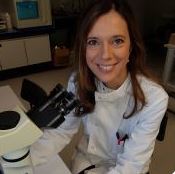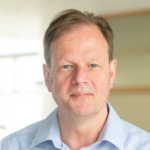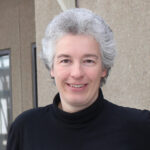Stem Cell-Based Modelling of Reproduction & Development
7th Dec 2023
Stem-cell based models of reproduction and embryo development have flourished over the past decade. These models recapitulate fundamental aspects of gametogenesis and peri-implantation development in a dish, as well as endometrial and placental function. Critically, they enable experimental approaches to unravel the molecular basis of human developmental disorders and infertility.
The Genesis Research Trust has partnered with the MRC Laboratory of Medical Sciences and the Imperial College Institute for Reproduction & Developmental Biology for its second symposium on stem-cell based models. This meeting aims to unite and grow the community working with in vitro models of early development and reproductive biology. It will provide a platform for current and future leaders from across the world to share ideas and discuss key topics for future research.
Registration fees:
£100 for Academics/Clinicians
£50 for Trainees (Students/Postdocs)
Registration from 8:50 am
9:20 Welcome from Chairs
Infertility and IVF challenges
9:30 Mitochondrial replacement – bridging the gap between risk reduction and disease prevention, Mary Herbert, Newcastle University
10:00 Regulation of Human Spermatogenesis at Single-Cell Resolution, Juanma Vaquerizas, Imperial College London
10:30 – 10:50 Break (coffee & biscuits)
Peri-implantation embryo development
10:50 Establishing the Epigenome in human development and Pluripotency, Peter Rugg-Gunn, Babraham Institute
11:20 Modulating the timing of mammalian development, Aydan Bulut-Karslioglu, Max Planck Institute for Molecular Genetics
11:50 The causes and consequences of aneuploidy in human embryonic stem cells, Ivana Barbaric, University Of Sheffield
12:20 – 14:10 Lunch Break
Maternal-foetal interactions
14:10 Molecular Mechanisms regulating Human Embryo Development, Norah Fogarty, King’s College London
14:40 Insights into early placental development – endometrial organoids as a tool for studying endometrial function and pregnancy outcomes, Tereza Cindrova-Davies, University of Cambridge
15:10 Modelling human embryo implantation: the obstacles, Jan Brosens, Warwick Medical School
15:40 – 16:00 Break (coffee & biscuits)
16:00 Keynote talk: Modelling the feto-maternal interface: Advances, Insights and Challenges, Myriam Hemberger, University of Calgary (virtual)
16:50 Closing Remarks from Chairs
Social Event 17:00 – 18:30 (drinks & nibbles)
*The programme is subject to change, all times shown are GMT
Ivana Barbaric, University Of Sheffield
Ivana is a Professor of Stem Cell Biology at the University of Sheffield, UK. Her research is focused on the basic biology of human pluripotent stem cells (hPSCs) and their applications in regenerative medicine and disease modelling. In particular, her group is investigating the causes and consequences of aneuploidy in stem cells, including the impact of aneuploidy on stem cell fate decisions and lineage specification during early development.
Her work on culture-acquired genetic changes in hPSCs is also informing strategies for reliable detection and minimising the occurrence of genetically variant cells, necessary for safe and efficient clinical translation of hPSC-based therapies. She is a member of the Steering Committee of the International Stem Cell Initiative, the General Secretary of the British Society for Cell and Gene therapy, a lead for the genetic stability of stem cells within the UK Regenerative Medicine Platform and a member of the ISSCR Task Force on Standards for Stem Cell Research, co-chairing the Working Group on Genomic Characterization.
Jan Brosens, Warwick Medical School
Jan Brosens graduated from KU Leuven, Belgium, in 1990 and pursued postgraduate training in Obstetrics and Gynaecology in the United Kingdom. He became a Member of the Royal College of Obstetricians and Gynaecologists in 1995 and a Fellow of the College in 2008. He obtained a PhD from the University of
London in 1999.
He was awarded a Wellcome Trust Clinical Scientist Fellowship in 1998. He joined Imperial College London, first as Chair of Reproductive Sciences (2004) and then as Chair of Reproductive Medicine (2008).
Currently, Jan Brosens is a Wellcome Trust Investigator, co-director of the Centre of Early Life at the University of Warwick, and scientific director of T
ommy’s National Miscarriage Research Centre, a partnership between Imperial College London, University of Birmingham, University of Warwick and their affiliated national health service trusts.
Aydan Bulut-Karslioglu
Aydan Bulut-Karslioglu is a stem cell researcher based at the Max Planck Institute for Molecular Genetics in Berlin, Germany. She studied chemical engineering and biology in Turkey. During her PhD in the lab of Prof. Thomas Jenuwein in Freiburg, Germany, she focused on the epigenetic regulation of repetitive DNA.
In 2013, she joined the lab of Prof. Miguel Ramalho-Santos at UCSF, San Francisco, where she made the breakthrough discovery of mTOR as a major regulator of developmental timing in mouse embryos. She developed an in vitro diapause protocol to put mouse early embryos into dormancy.
Since 2018, she is a group leader at the MPIMG in Berlin, where she works on how the environment actively shapes the timing and trajectories of embryonic development.
Twitter @bulutkarslioglu
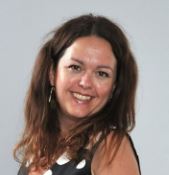
Tereza Cindrova-Davies received her MPhil and PhD from the University of Cambridge. Tereza worked as a research fellow at the University of Cambridge between 2003-2022, held a lectureship at the Queen Mary University of London until November 2023, and she will resume working at the Centre for Trophoblast Research, University of Cambridge, as a Licencing Manager from January 2023. Tereza has been awarded international prizes for her research, including the Elsevier Science New Investigator Award at the IFPA meeting in Glasgow in 2005, and the Gabor Than award for ‘outstanding contributions to the field of placentology in all its aspects’, at the IFPA meeting in Graz in 2008.
Tereza’s research has embraced the role of oxidative stress in normal and pathological pregnancies, placental senescence and H2S in pregnancy pathologies. Early pregnancy is a key area of Tereza’s current research interests. Her recent research concentrates on investigating early placental development, the role of the human yolk sac and histotrophic nutrition. Tereza has been instrumental in developing human and mouse organoid cultures, and used these to investigate the function of the endometrial glands in early pregnancy.
In addition, she recently succeeded in deriving physiologically relevant endometrial organoid cultures non-invasively from menstrual flow. Her future research is directed at exploring why the majority of human pregnancies fail, either before implantation or as a result of early pregnancy loss
Norah Fogarty, King’s College London
Norah obtained her PhD from the Centre for Trophoblast Research at the University of Cambridge, where she studied transcriptional dynamics in the syncytiotrophoblast of the human placenta. She subsequently undertook postdoctoral training in the lab of Prof. Kathy Niakan at the Francis Crick Institute employing single-cell RNA-sequencing, CRISPR/Cas9-mediated genome editing and molecular analyses of human embryos to elucidate lineage-specific gene expression.
Norah was awarded a King’s Prize Fellowship and then a UKRI Future Leaders Fellowship to establish her own group at the Centre for Gene Therapy and Regenerative Medicine and Department of Women and Children’s Health at King’s College London in 2020. Her group works towards elucidating molecular mechanisms regulating early placenta development in the human by leveraging in vitro models, human embryos and ex vivo placenta samples.
Myriam Hemberger
Myriam Hemberger trained at the University of Freiburg and Max-Planck Institute for Molecular Genetics, Berlin, Germany, and as postdoctoral fellow in Toronto and at the University of Calgary, Canada.
From 2004-2018 she held a Group Leader position at the Babraham Institute in Cambridge, UK. In October 2018, she joint the University of Calgary as Full Professor in the Departments of Biochemistry & Molecular Biology and Medical Genetics. She is also Program Director of the Precision Medicine & Disease Mechanisms program at the Alberta Children’s Hospital Research Institute (ACHRI)
Her scientific expertise is centered on early developmental processes that lead to normal placentation and, consequently, a healthy reproductive outcome. In 2019 she was awarded the March of Dimes and Richard B Johnson Prize in Developmental Biology for her contributions to the field.
Over the past years, her research has focussed on trophoblast stem cells, the unique stem cell population of the placental cell lineage. She has made significant contributions to our understanding of the molecular mechanisms governing their self-renewal and differentiation in the mouse model. She has also contributed to the groundbreaking establishment of trophoblast stem cells from the early human placenta, endowing us with unprecedented opportunities to study early placentation. In addition, Myriam led a mouse phenotyping screen that established the first systematic analysis of the impact of embryonic lethal gene mutations on placentation. Finally, she also studies the impact of maternal age on uterine-trophoblast interactions during early development.

Mary Herbert joined Monash University in July 2023 as Professor of Reproductive Biology. She also holds an appointment at Newcastle University and Newcastle Fertility Centre, UK. She was awarded a PhD from Newcastle University in 1998 and was appointed Consultant Embryologist at Newcastle NHS Hospitals Trust. In 2006 she moved to an academic position at Newcastle University where she established a closely integrated team of research and clinical scientists.
Her work in the field of mammalian reproductive cell biology is focused on understanding the mechanisms governing transmission of the maternal genomes (nuclear and mitochondrial) and on developing clinically relevant methods to prevent disease transmission through the female germline. At Monash, she is co-lead of an AU$15 million project to conduct the first pilot study of mitochondrial replacement in Australia. She was elected Fellow of the Academy of Medical Sciences (UK) in 2019.

Peter Rugg-Gunn is a Senior Group Leader at the Babraham Institute in Cambridge. He is also an Affiliate Principal Investigator at the Cambridge Stem Cell Institute and at the Centre for Trophoblast Research and is Head of Public Engagement at the Babraham Institute.
He is the scientific lead for the Human Developmental Biology Initiative.
Peter’s research interests centre on understanding how gene activity is controlled during human development and how this affects cell fate decisions in embryos and also in stem cells grown in the laboratory.

This conference is aimed at those interested in using stem cells and stem-cell derived models to study normal development and developmental disorders. Featuring talks from international leaders on a broad range of topics including stem-cell-based embryo models, Maternal-foetal interactions, Infertility and IVF challenges and much more!
Conference proceeds
Proceeds from all of our conferences support our research into problems with fertility, pregnancy and birth. Our scientists at the Institute of Reproductive and Developmental Biology at Imperial College London continue to lead the world in this field of research. Many major findings at the site have contributed to the understanding of fertility and fetal development. This has improved in utero and newborn babies’ health.
Please see the Genesis Research Trust website for further information about us.
VENUE:
We will be delivering the conference in https://lms.mrc.ac.uk/new-building/
MRC Laboratory of Medical Sciences
Hammersmith Hospital Campus,
Du Cane Road,
London
W12 0NN
GOOGLE ADDRESS:
https://maps.app.goo.gl/YUBZ5irq4cXR3WZv8
WHAT3WORDS ADDRESS:
Please see the link below in order to see the MRC entrance:
https://w3w.co/moons.cycle.shock
Directions:
- From WHITE CITY tube station take the bus n. 72 or 272 toward East Acton. After 4 stops you get off to Hammersmith Hospital and in 5 minutes you are in MRC London Institute of Medical Science.
- From WOOD LANE tube station take the bus n. 72 or 272 toward East Acton. After 4 stops you get off to Hammersmith Hospital and in 5 minutes you are in MRC London Institute of Medical Science.
- From EAST ACTON tube station take the bus n. 72/272/283 towards White City. After 2/3 stops you get off to Hammersmith Hospital and in 5 minutes you are in MRC London Institute of Medical Science.
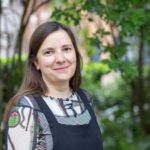
Véronique Azuara is Reader of Stem Cell Biology at Imperial College London, Faculty of Medicine, and an Associate Member of the Francis Crick Institute. Her group focuses on understanding how cell potency and specification are balanced in stem cells and in the developing mammalian embryo from transcriptional, epigenetic, and metabolic perspectives. Full bio here
Twitter: @VAzuaralab
PWP: https://www.imperial.ac.uk/people/v.azuara

Michelle Percharde is a UKRI Future Leaders Fellow and heads the “Chromatin and Development” group at the MRC LMS. Her lab uses mouse and human stem cell and embryo models to study the intersection between chromatin and transposon regulation in development and disease. Full bio here
Twitter: @MPercharde
Websites: www.perchardelab.com, https://lms.mrc.ac.uk/research-group/chromatin-and-development/

